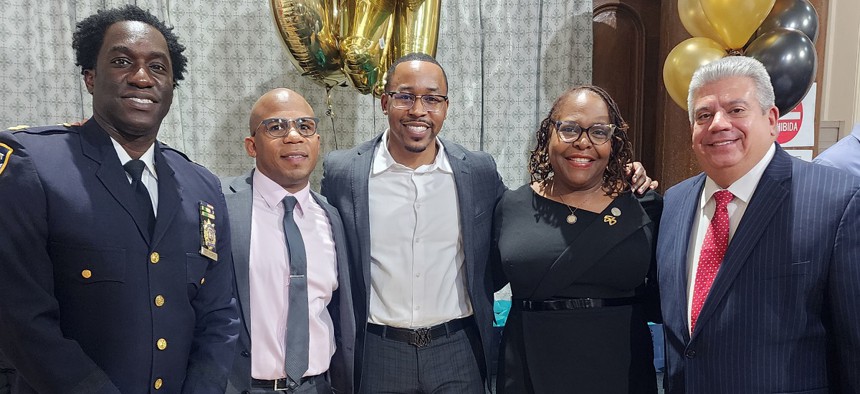Opinion
Opinion: Addressing public safety requires true collaboration between community organizations and government
A look at the innovative Project Restore pilot program.

From left to right, New York City Police Department Captain Derby St. Fort; Dominic J. Dupont, Project Restore mentor/facilitator; Jarrell E. Daniels, project director at Columbia University’s Center for Justice; Assembly Member Stefani L. Zinerman and Brooklyn District Attorney Eric Gonzalez. (Photo courtesy of Jarrell E. Daniels)
At 18, navigating poverty in the South Bronx and confronting a myriad of challenges, I found myself entangled in the fabric of neighborhood violence. As a result of an ongoing street conflict and a near-fatal shooting, I was arrested in a 10-man gang conspiracy case with several of my childhood friends. Taking responsibility for my actions and educating myself on the criminal legal system, including participating in a transformative college course while incarcerated, I couldn't overlook the lack of resources and opportunities in communities like mine, as well as the racial disparities among people incarcerated throughout New York state. For many of us, our destiny seems etched in stone, from poverty, to the local precinct, to the courtroom and ultimately a prison cell. My experiences led me to envision a new legal and social service system where those facing community challenges can be redirected away from gang membership and towards a path of purpose and opportunity.
Seamlessly connecting someone to employment, supportive services and mentorship is the key to resolving scarcity and safety concerns. Through a targeted street violence intervention model and a collaborative community-government partnership, a new public safety philosophy was exemplified in a recent Columbia University, Center for Justice pilot program called Project Restore, launched as a joint effort between the Mayor’s Office of Criminal Justice, Brooklyn District Attorney's Office, Bridgestreet Development Corporation and Inside Circle. This community development approach provided a network of support that extends well beyond an immediate crisis response.
With an initial $2.5 million seed funding commitment, Project Restore officially began in January 2023 as a 12-month gang intervention program. The program assisted 30 street-affiliated young men – from adjacent Brooklyn housing departments involved in decade-long gun violence street conflict – in overcoming personal and community challenges and their involvement in the criminal legal system. Since its inception, Project Restore has emerged as a holistic community-government partnership model.
Through case management, life skills training, credible mentorship, trauma healing circles, educational and employment pathways, we’ve since enrolled four participants into an accredited Peer Navigator course at John Jay College. Seven have satisfied their court requirements and have had their cases diverted to probation, community service or Alternative-to-Incarceration programs. Eight leaders from opposing sides met together for an intimate discussion about street violence prevention that acknowledged their neighborhoods’ histories and challenged them to think through a co-existence and reconciliation approach, helping them find common ground across differences. Eighteen have secured full or part-time employment. Seven are participating in a Community Safety Working Group and undergoing peer facilitation training. One is now a full-time student at Columbia University’s School of General Studies.
At its core, Project Restore is committed to trauma-informed services, acknowledging the profound impact of violence on individuals and communities. The program offers wraparound support, including life coaching, site visits, counseling, and therapeutic retreats, creating a safe environment essential for fostering healing and resilience among those who participate. This compassionate approach ensures that participants receive the tools needed not only for personal growth but also to become positive contributors to their communities. In addition, as part of the services provided, individuals are offered educational and vocational opportunities. This model is an essential catalyst for breaking the cycle of trauma and hardship.
Project Restore’s web of supportive services prioritizes community-centered rehabilitation. Beyond individual needs, the program enriches residential quality of life, such as building healthy community-police relations, strengthening local centers and programs and providing a blueprint for positive change. By emphasizing long-term group cohesion among participants, the program enables individuals to rebuild their lives and contribute meaningfully and productively to driving change within their communities.
The program represents a precision intervention model, departing from traditional law enforcement approaches of simply removing street-affiliated members from society through arrest and incarceration. Instead, law enforcement agencies and community organizations collaborate in identifying participants most in need of restorative programming. This intentional process ensures that support is directed precisely where it can yield the most significant impact.
The incredible work of all involved, including the program’s founding team: myself, Jarrell Daniels; Geraldine Downey, director at Center for Justice; Nigel Farinha, chief of gang prosecution at Office of Special Narcotics Prosecutor; Meg Reiss, Manhattan chief assistant district attorney; UniQue Starks, program director at Project Restore; and Gabriel Feldman, program manager at Project Restore. I also want to recognize the transformative government leaders who invested in the program model and believe in community-led solutions: Brooklyn District Attorney Eric Gonzalez, Deanna Logan, executive director of the Mayor’s Office of Criminal Justice, and Captain Derby St.Fort of the New York City Police Department. All have been a major factor in the success of the program.
Project Restore’s precision intervention model, coupled with a holistic, community-driven approach, represents a transformative blueprint for addressing the challenges of gang and gun violence. By establishing partnerships, implementing trauma-informed services, offering educational and vocational opportunities, and centering rehabilitation, this initiative aims to build bridges to healing. A collaborative commitment like this ultimately builds resilient communities and empowers individuals to overcome the challenges wrought by poverty and violence.
Jarrell E. Daniels is a community organizer, Truman Scholar and founding director of the Justice Ambassadors Youth Council at Columbia University’s Center for Justice.
NEXT STORY: Opinion: Keep NYC after-school programs affordable, while still paying workers fair wages
